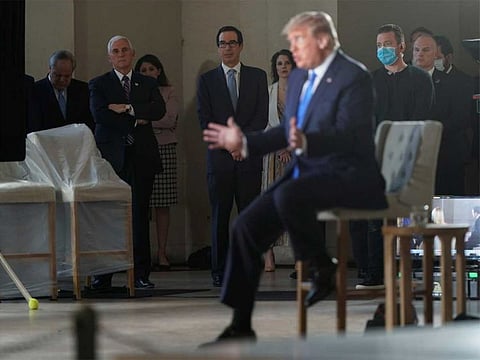Trump’s misjudgment worsened Covid-19 response
The US president has surrounded himself with yes-men, further complicating the crisis

“You have 15 people, and the 15 within a couple of days is going to be down close to zero.”
We have contained this, and the economy is “holding up nicely.”
It’s not nearly as serious as the common flu.
We’re going to have 50,000 or 60,000 deaths, and that’s great.
OK, we may have more than 100,000 deaths, but we’re doing a great job and should reopen the economy.
You sometimes hear people say that Donald Trump and his minions minimised the dangers of COVID-19, and that this misjudgement helps explain why their policy response has been so disastrously inadequate. But this statement, while true, misses crucial aspects of what’s going on.
At a time of crisis, America is led by a whiny man whose ego is too fragile to let him concede ever having made any kind of error. And he has surrounded himself with people who share his lack of character
For Trump and company didn’t make a one-time mistake. They grossly minimised the pandemic and its dangers every step of the way, week after week over a period of months. And they’re still doing it.
Now, everyone makes bad predictions; God knows I have. But when you keep getting things wrong, and especially when you keep getting them wrong in the same direction, you’re supposed to engage in some self-reflection — and learn from your mistakes.
Why was I wrong? Did I give in to motivated reasoning, believing what I wanted to be true rather than following the logic and evidence?
No self-reflection
To engage in such self-reflection, however, you have to be willing to admit that you were wrong in the first place.
We all know that Trump himself is incapable of making such an admission. At a time of crisis, America is led by a whiny man whose ego is too fragile to let him concede ever having made any kind of error. And he has surrounded himself with people who share his lack of character.
But where do these people come from? What has struck me, as details of Trump’s coronavirus debacle continue to emerge, is that he wasn’t getting bad advice from obscure, fringe figures whose only claim to fame was their successful sycophancy.
On the contrary, the people telling him what he wanted to hear were, by and large, pillars of the conservative establishment with long pre-Trump careers.
In late March Trump was unhappy with epidemiological models suggesting a death toll over 100,000 — which, by the way, now seems highly likely.
No expertise
So the White House created its own team led by Kevin Hassett, whom The Post describes as “a former chairman of Trump’s Council of Economic Advisers with no background in infectious diseases.” And this team produced an analysis Trump aides interpreted as implying a much lower death toll.
Aside from not having any background in epidemiology, Hassett has an, um, interesting record as an economist.
He first attracted widespread attention as co-author of a 1999 book claiming that stocks were greatly undervalued, and that the Dow should be 36,000 (which would be around 55,000 today, adjusting for inflation).
It quickly became clear that there were major conceptual errors in that book; but Hassett never admitted error.
In the mid-2000s Hassett denied that there was a housing bubble, suggesting that only liberals believed that there was.
You might think that an economist would pay some professional penalty for this kind of track record — not simply one of making bad predictions, which everyone does, but of both being wrong at every important juncture and refusing to admit or learn from mistakes.
But no: Hassett remains, as I said, a pillar of the modern conservative establishment, and Trump called on him to second-guess experts in epidemiology, a field in which he has no background.
And Hassett isn’t even uniquely bad. Unlike, say, Stephen Moore, who Trump tried to put on the Federal Reserve Board, he does not, as far as I know, have a history of simply getting basic numbers and facts wrong.
The moral of this story, I’d argue, is that observers trying to understand America’s lethally bad response to the coronavirus focus too much on Trump’s personal flaws, and not enough on the character of the party he leads.
Yes, Trump’s insecurity leads him to reject expertise, listen only to people who tell him what makes him feel good and refuse to acknowledge error.
But disdain for experts, preference for incompetent loyalists and failure to learn from experience are standard operating procedure for the whole modern GOP.
Trump’s narcissism and solipsism are especially blatant, even flamboyant. But he isn’t an outlier; he’s more a culmination of the American right’s long-term trend toward intellectual degradation. And that degradation, more than Trump’s character, is what is leading to vast numbers of unnecessary deaths.
Paul Krugman is one of America’s foremost public intellectuals. He is a Nobel laureate and teaches economics at the City University of New York
(NYT)


